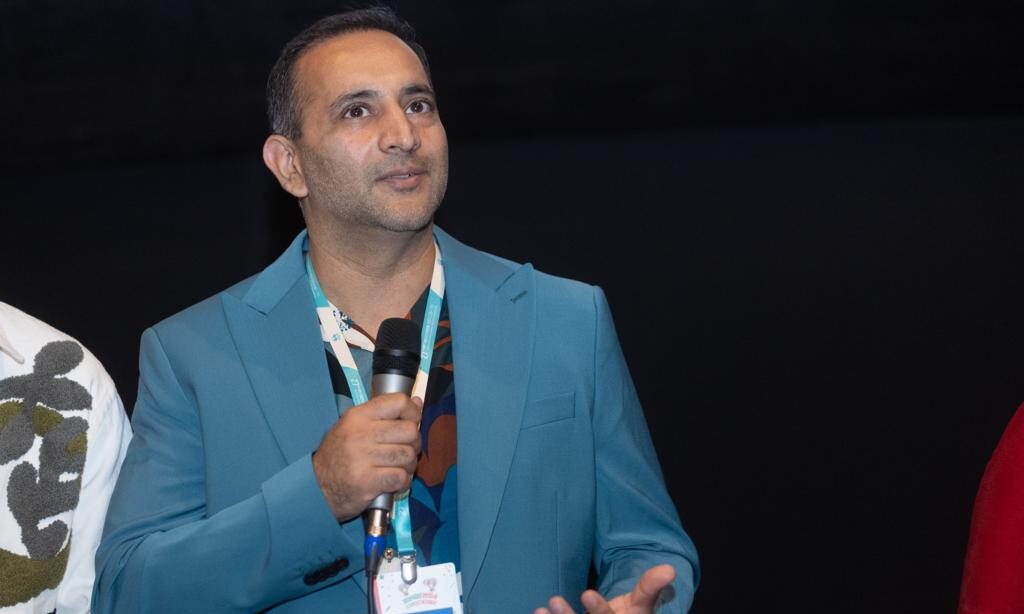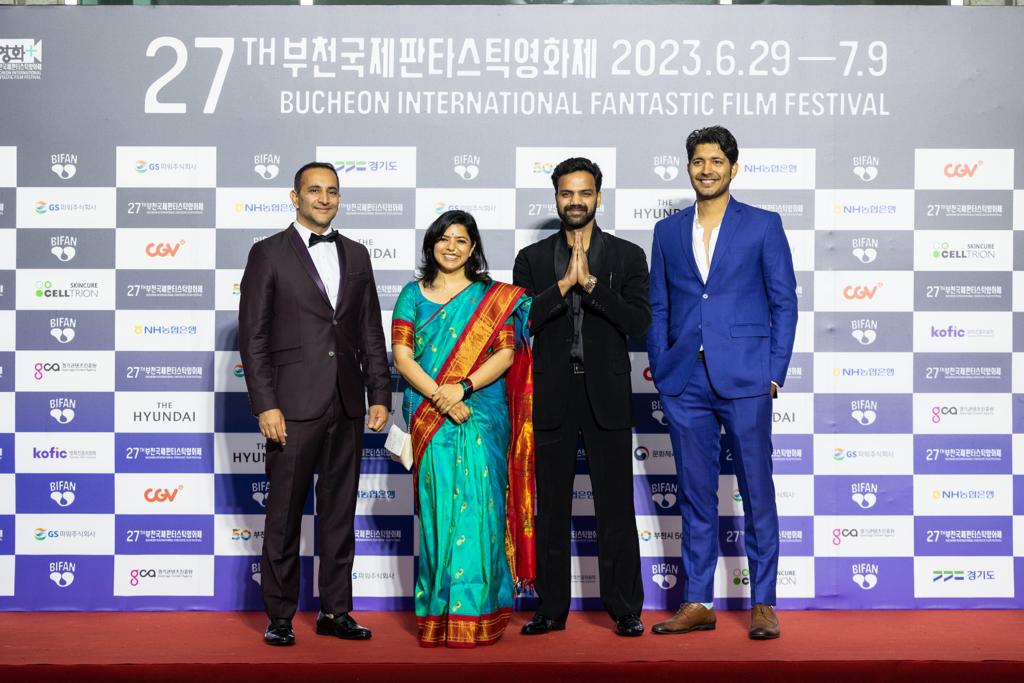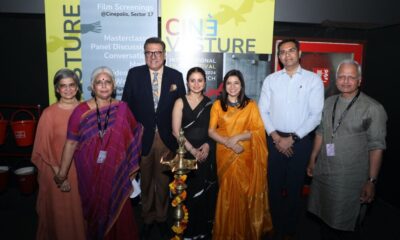Exclusives
Privacy director Sudeep Kanwal: “Privacy is not talked about much in India for some reason”
Privacy starring Rajshri Deshpande had its world premiere at the Bucheon International Fantastic Film Festival (BiFan) in South Korea.
Published
9 months agoon

By Sameer Salunkhe
New York-based Indian-origin filmmaker Sudeep Kanwal’s debut feature film Privacy starring Rajshri Deshpande had its World Premiere at the Bucheon International Fantastic Film Festival (BiFan) in South Korea. Privacy is a social thriller based in Mumbai and tries to address the issue of how privacy is compromised through the gaze of surveillance cameras. In an exclusive conversation with Cine Blitz, Sudeep Kanwal talks about his BiFan experience, journey of Privacy, and struggles of independent cinema.
What was the takeaway for you from the whole experience at the World Premiere of Privacy at BiFan?
Sudeep Kanwal: BiFan was an overall amazing festival, with very humble people around Bucheon City. The language was a big problem, but people who were not related to the film were also very humble and readily came forward to help us, showing us the direction whenever we were lost.
The screenings went very well. We had Three Screenings. The way you can tell things went well is by the Q&A. It was great to hear some questions that were deep. Some of the audience members caught very minute details. I had shown this film to my friends and family members, but even they could not get to those details. It was amazing to have an audience that is so into the whole cinematic language. It was also amazing to see how the audience could relate one thing to another.

Team of Privacy at BiFan
What was that idea or emotion or visual that gave rise to Privacy?
Sudeep Kanwal: The very first image I had in my head was that of this lonely girl looking at several screens and watching people. I wrote it down a few years back. But the real Genesis was when I was in Mumbai for another project. I read articles on how the Mumbai surveillance project was getting a reboot. Thousands of crores were being spent, a lot of new cameras were being installed, and how good the new technology is.
Also read: The Trial actress Sheena Chohan: “I try to be like a blank page for my directors”
All that is great and it obviously helps: it can report traffic, can report accidents, it can save lives but none of the articles talked about privacy. Would privacy be an issue or not? I live in New York. In the West, we see things a little differently. We do talk about the positive aspect of something but we also talk about the other side of the technology.
I read tons of articles but I didn’t read any articles talking about the cons of the technology. That triggered the idea to write something about which is not out there. The landscape of Mumbai is so interesting, you could be standing on a multi-millionaire building and you can also see slums. It’s a striking image. So, the socio-economic factor also became part of the story along with this girl Roopali’s story who lives in this metropolis. So, those elements came together and the whole story happened.
There are multiple layers to this vast topic of privacy. How did you zero down on what you wanted to tell through this film?
Sudeep Kanwal: The privacy issue as a whole can be addressed in many ways. For example, Snowden (2016), which talks about data privacy. I always wanted to show the privacy issue through the language of surveillance cameras. What made it timely was that it just happened in Mumbai. They just invested in that technology recently. So, it’s very timely for Mumbai, for India in that sense.
There’s so much stuff you see online now where people just share footage from a CCTV Camera, a private camera and they would just show somebody meeting with an accident, or somebody getting beaten up and we don’t even think of repercussions like what it could lead to. Let’s say if you were in that footage how would it impact your life if that video would go viral without your permission?
Also read: Trial Period director Aleya Sen reveals why she cast Genelia Deshmukh and Manav Kaul in the lead roles
Privacy is not talked about much in India for some reason. I don’t know why it’s just accepted that it’s ok for people to be in each other’s space. It’s ok not to be by yourself. It’s ok if the cameras are out there, they are for our safety. Everything is taken for granted. No one looks at the other side of things like how it could be manipulated, how it could be used against you. So, in general, a lot of people are alien to the idea of privacy. So, I wanted to talk about privacy, I think it’s just the surveillance, the language of it, it’s more visual and that’s why I wanted to do it with cameras rather than doing it through data or something else.
Post-pandemic when people’s viewing habits have changed and even mainstream cinema is struggling to find audiences in theatres, how do films like Privacy i.e. independent movies survive?
Sudeep Kanwal: Independent cinema was never easy. There was a good 5-6 years period where independent cinema was getting representation on OTT platforms and some of those films came out. But I think we are back in the dark ages again because, since the pandemic, the big productions have ended up on OTT platforms and independent cinema is struggling again because OTT platforms have become the ‘the studios’ in a way now.
It’s not easy to survive as an independent filmmaker. But the only thing you can do is try to tell a story that is different which is something that no one is trying to say, which is not something that is happening in mainstream cinema anywhere.
The second thing is why do you want to be a filmmaker? Why do you want to tell a story? Is it for recognition and money? Then you should not be doing it. You want to tell stories because you don’t know how else to live. There are so many ways you can make money. Don’t make films.
Also read: Priyanka Chopra Jonas: “I had always believed that I am destiny’s favourite child”
With all that I hope that things get better again where somebody comes along the way who can push indie films and bring it in front of the audience. Because indie cinema drives the creative part of the industry. There’s so much to draw from indie films because that’s where people are experimental, that’s where people are edgy because they don’t have to answer to a big studio. So, we don’t have to have a dance number in our films to sell the tickets. So, indie cinema has to survive if we want filmmaking, in general, to do better and compete not just in India but outside of India as well.
So, when are you planning to run the Cinema in India?
Sudeep Kanwal: We still have our festival run. Our second festival is in August, Cinequest in San Jose. Then we have a whole bunch of festivals For, 6-7 months after that also we will be in the festivals. So, we don’t have a release date.
Filmmaking is a series of decisions that you take over a period of long time. Which decisions are you most proud of?
Sudeep Kanwal: I am proud that I chose Rajshri in the film. I was told not to make this film my debut film because this is an independent film. The funds, the money, the resources, everything is an issue, trying to get people on board is a struggle too when you are making a first feature.
This was a tough film especially when there was a lack of money. Because there are CGI shots, there are some visual effects as well. It’s a complicated multi-layered story. But I am proud that I still chose this. I took it as a challenge. So, I am proud of me sticking to the script as my first film no matter how many challenges I had to face making it.
You may like


Boman Irani, Rasika Dugal, and Rajshri Deshpande grace the Opening ceremony of the first edition of Cinevesture International Film Festival


7 actors who impressed with their performances on OTT in the first half of 2023


Rajshri Deshpande and Director Sudeep Kanwal pose on the red carpet of Privacy’s premiere at BiFan


Keep those curtains closed: Watch the teaser of Rajshri Deshpande’s ‘Privacy’


Abhilash Thapliyal’s films Privacy and Kennedy to Premiere at Korea’s Bucheon International Fantastic Film Festival


Trial By Fire fame Rajshri Deshpande is a real and reel life fighter












